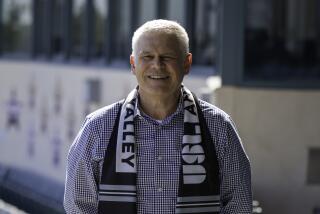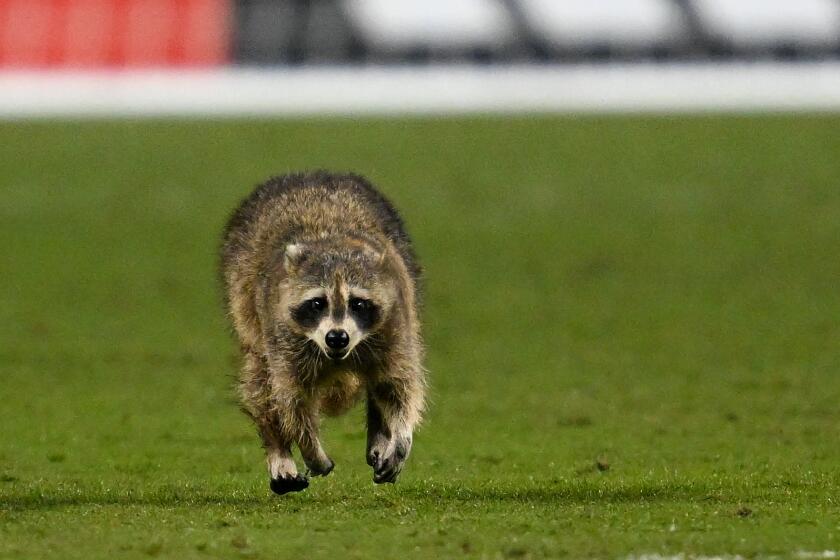FIFA President Is Facing a Dark, Stormy Outlook
Only five weeks ago, Joseph “Sepp” Blatter was basking in the afternoon sunshine at the Rose Bowl, seemingly at peace with the world as he presented the CONCACAF Gold Cup trophy to the victorious United States team.
Since then, however, angry storm clouds have gathered around the FIFA president and the impending deluge could sweep the 66-year-old Swiss banker, ostensibly soccer’s most powerful figure, right out of office.
There have, for example, been published allegations of bribery, claims that Blatter supporters bought the votes that got him elected president in 1998 as successor to his former boss, Brazil’s Joao Havelange.
Then too, there are serious concerns that FIFA’s finances are in disarray and that Blatter has been covering up the potential economic disaster facing world soccer’s governing body.
One senior FIFA official has said that the Salt Lake City cash-for-votes scandal that engulfed the International Olympic Committee “actually pales in its extent compared with FIFA’s own scandal.”
Blatter has consistently denied all bribery and corruption claims and has said they are part of a smear campaign to oust him when he comes up for reelection at the FIFA Congress in Seoul, South Korea, on May 29, two days before the World Cup begins.
But in the last two weeks, the embattled Blatter has suffered significant political losses, and support for him appears to be eroding almost daily.
Things started going wrong last April, with the economic collapse of International Sports Media and Marketing (ISMM) and its subsidiary, ISL Worldwide. The pair were FIFA’s World Cup partners, one holding the marketing rights to the 2002 and 2006 World Cup tournaments and the other the television rights to both events.
When ISMM/ISL was declared bankrupt by a Swiss court in May, with debts of $1.2 billion, it was said to have cost FIFA about
$32 million, according to its own estimates. But Blatter’s critics contend the amount might be as much as $300 million.
More recently, fears have been raised that the financial crisis facing German media giant Kirch, which took over the World Cup television rights from ISL, might imperil worldwide television coverage of this summer’s tournament.
In Tokyo on Feb. 27, Blatter said that “irrevocable bank guarantees” mean there “is no danger of the World Cup not being on television.” The very next day, Feb. 28, Britain’s Daily Mail newspaper dealt Blatter’s cause a severe blow when it published a report by Andrew Jennings, the journalist who had exposed IOC corruption in awarding Salt Lake City the recent Olympic Games.
Jennings’ report claimed that tens of thousands of dollars were paid to FIFA members to vote for Blatter in his 1998 election campaign against Lennart Johansson, the Swedish president of European soccer’s governing body, UEFA.
The Daily Mail said that 18 African votes promised to Johansson went to Blatter instead “after Arab backers [of Blatter] knocked on hotel doors in the dead of night” and money changed hands.
The newspaper quoted Farah Addo, a vice president of the Confederation of African Football (CAF) and president of Somalia’s soccer federation, as saying all 51 African votes had been pledged to Johansson, but that bribes had been offered to affect the election’s outcome.
“The night before the election, people were lining up in Le Meridien Hotel [in Paris] to receive money,” Addo told Jennings. “Some told me they got $5,000 before the vote and the same the next day, after Blatter won.
“I made my own inquiries and discovered 18 had gone over to Blatter.”
Addo said he was offered $100,000 to switch his vote, but rejected the attempted bribe.
Blatter defeated Johansson, 111-80, a result that would have been reversed had the 18 votes in question not switched sides.
In the wake of the Daily Mail article, FIFA’s president angrily denied any wrongdoing.
“I was not surprised that a report like this has surfaced at this time,” he told Agence France-Presse from FIFA’s Zurich headquarters.
“It’s all part of a campaign of destabilization and defamation which has been directed against me for some time.”
On March 1, the Daily Mail fired a second volley at Blatter, quoting Mathieu Sprengers, president of the Dutch soccer federation and treasurer of UEFA, as saying that Blatter was using funds earmarked for the 2006 World Cup in Germany to help keep FIFA financially afloat in 2002. Sprengers said Blatter had denied the claim in public but had admitted it in private.
Blatter tried to put the financial scandal behind him last week when FIFA’s Financial Committee-- headed by FIFA senior vice president Julio Grondona of Argentina, a close Blatter ally--approved an audit showing FIFA’s finances are sound.
“It is certain that we will amply cover all current and future risks and any other unexpected expenses,” Grondona said.
That was challenged immediately, however, and in an extraordinary general meeting Thursday of FIFA’s 24-member Executive Committee, Blatter lost his battle against an internal investigation into FIFA’s
finances.
Ranged against him were the presidents of the European, African and Asian soccer confederations: Johansson, Issa Hayatou of Cameroon and Chung Mong-Joon of South Korea.
Chung, in a January letter to Jack Warner, CONCACAF’s president, said that the IOC’s Salt Lake City scandal “actually pales in its extent compared with FIFA’s own scandal.” He said an investigation into FIFA’s financial state is vital.
“Without such a legitimate probe, no one ... would find it easy to believe the simple explanations from the top,” he wrote.
“I would like to emphasize that the management of FIFA’s finances is flawed and the lack of transparency is at the root of current speculations.
“It is of critical importance that we provide a clear transparent investigation of FIFA’s financial situation so that we could restore FIFA’s honor and image to the world.”
That investigation will now get underway.
Meanwhile, Blatter remains the only candidate in the May 29 election, but Cameroon’s Hayatou, and possibly even Chung, might join the fray in the coming weeks.






